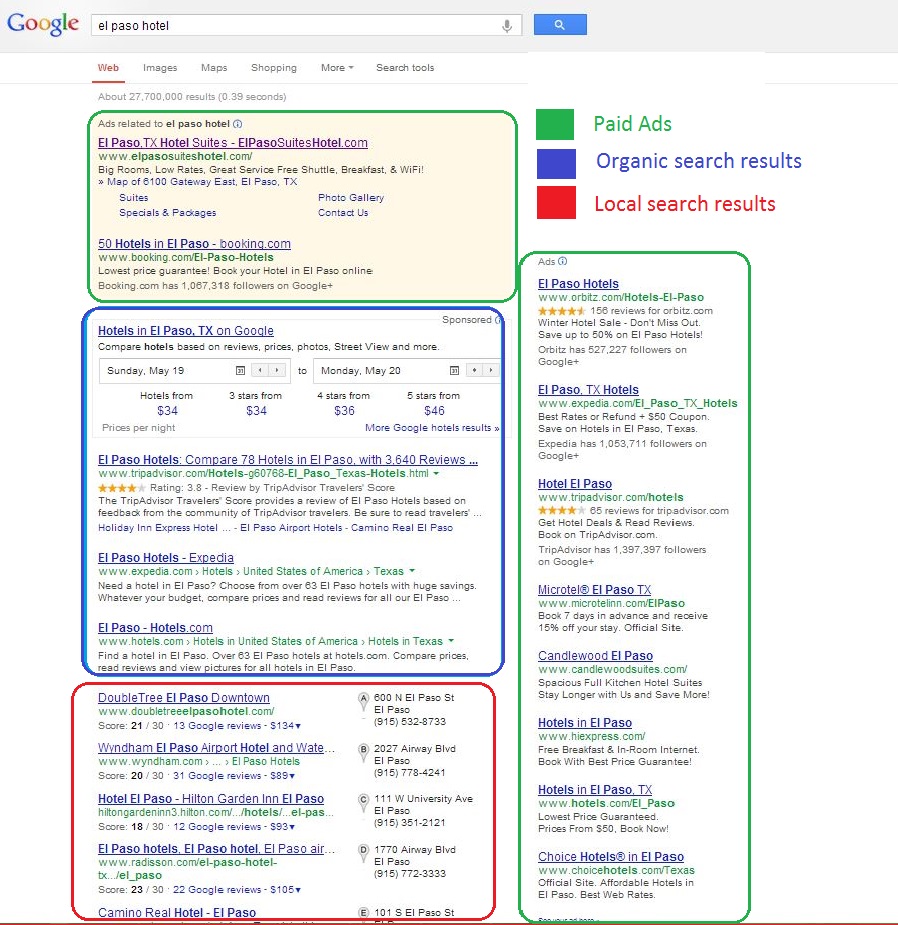As a hotelier, it’s difficult to know where to place your digital marketing budget for the best ROI. There are plenty of options, but none have the instant results quite like pay-per-click advertising (PPC). Maybe you have heard that your hotel brand participates in pay-per-click advertising, but you may not be certain of what PPC advertising means for your specific hotel. Here’s a crash course on PPC advertising for hotels, why it is different than organic SEO efforts, and why your property should be investing in this channel.
Pretend for a moment that you are grocery shopping. You walk up and down the aisles, trying to find the perfect product for your dinner/meal/snack/weird late-night food cravings, “searching” through all the products, picking up packages and reading their descriptions, until you find the one that you feel is best for you. Purchase made.
Let’s identify the steps here:
- You have a need.
- You, the shopper, the guest, the user, “search” for something to fill that need.
- The store lines its shelves with things that might possibly fulfill your need, and…
- You pick the most relevant “answer” to best fulfill this need. If you picked one brand, for example Special K cereal, from 100 choices on the shelves, this would represent an organic search.
Now let’s say the Kellogg’s brand paid for better placement of their Special K cereal in order to make their product stand out from their competitors. Maybe instead of the cereal appearing on the bottom shelf, Kellogg’s pays to have their Special K cereal placed at eye-level in the high-traffic half of the cereal aisle. This would represent a paid search effort. Paid search efforts are a way to ensure that you are more visible than your competitors to shoppers.
What is PPC?
- Pay-per-click advertising is exactly what it sounds like; you only pay for the clicks your ads receive. No clicks = No spend.
- Cost-Per-Click (CPC): this is the cost incurred per click. CPC is a basic metric that is often used to set budgets and expectations for a particular account.
For Example: If your average CPC is $2, and you budget $1,000 a month, you can expect (roughly) 500 clicks a month from the ads. - PPC ads show up on the top and the right side of a search engine results page (in green in photo below) after a user has entered the query into the search engine. The ad will enter an auction for the position, and the winning ad will be shown.

As this photo shows, the sponsored placements (green) will always be visible on the results page, while the organic placements (blue) and the local placements (red) depend on ranking factors. This is where SEO comes in.
Why Do Advertisers Need PPC?
- The purpose of paid search is to capture traffic that might have otherwise been directed to the highest ranking site on the organic results page. It is one of the quickest and easiest ways to put your business on the top of the search engine results page, which can be especially beneficial for a site that does not rank well organically for certain keywords or search queries.
- PPC enhances all other marketing tactics: social media, email marketing, SEO, local results.
- PPC is easily customized to very specific products, promotions, or offerings.
- PPC can send traffic to the most relevant page on the site, eliminating the user’s need for navigation (and eliminating chances to drop-off!).
For Example: if you want to drive more traffic for summer weddings in Sacramento, your ads can send the user directly to your weddings page that showcases pictures, floor plans, catering, etc. - Out of budget? **Click** Now your PPC advertising and spending is turned off until you turn it back on. Instantaneous.
Why Do Hotels Need PPC?
Nearly every business can benefit from PPC Advertising, whether in building brand awareness, selling a specific product, or even getting folks into a brick-and-mortar location. Every business should be utilizing this channel in their online marketing strategy, and hotels specifically can greatly benefit from PPC in a number of ways:
- Hotels are constantly battling dependency on OTAs, like Expedia and Travelocity, which collect a hefty margin for each booking. PPC efforts allow hotels to capture some of the market that would have gone straight to an OTA, and encourages guests to book accommodations on their most profitable channel: their website.
- Hotels can direct traffic to their specific property. This ensures that the conversion (and revenue!) stays with your property, not on a different property in the same area.
For Example: if a search is done for “hotels in Oakland”, there will be landing pages devoted to all of a brand’s properties in Oakland. A hotel will face competition from its own sister properties. The goal of these pages is to elevate the brand as a whole, not the specific hotel. - SEO + PPC = page dominance. Hopefully, your SEO tactics have put you at the top for both organic and local results. Pair those efforts with PPC’s ability to show your ad at the top or right of the page, and you have now given your audience THREE different opportunities to come to your site and not your competitors’.
- Special offers, events, wedding or restaurant pages: Brand.com will run ads for “Hotels in [insert big city here]”. While this does drive traffic to your property’s home page, broad searches such as these indicate the user is likely just beginning their search and not ready to book. By running property-specific PPC, you can now send those seeking wedding venues, on-site restaurants, business meeting space, and anything else your property offers to a specific landing page.
What’s The Catch?

While few and far between, there are some ‘cons’ of PPC advertising. With all the dynamic ads and automatic bidding that Google and Bing offer, it’s fairly easy to pick your keywords, set your budgets, and launch your PPC campaign. Here’s the part that’s not so easy: optimizing. Optimizing PPC campaigns, strategies, and budgets is literally a full-time job (thank goodness!). Optimizing and testing is not critical to running PPC ads, but it is absolutely critical to the success of these efforts. The most rewarding (and fun, if you’re as big of online marketing nerds as we are at Blue Magnet) aspect of PPC advertising is its ability to always be one-upping itself.
For Example: run ads A and B at the same time. If ad B gets more clicks/conversions/whatever-your-goal-metric-is than ad A, stop running A, and now try to beat B.
Finding the sweet spot for your bids and ad rank takes a lot of knowledge, skills, and many, many tests.
Catch #2: Without proper access to the HTML code that makes up your site, conversion tracking is pretty much impossible. Hotels that have standalone sites in addition to their brand site can track the shopper’s journey from PPC ad to hotel site to reservation page. Without a standalone site, you can only track the shopper coming to the hotel’s site. Without this valuable data, it can be difficult to see the exact ROI of your PPC efforts.
With thant in mind, you may be thinking: “So, if I don’t have an independent site, I shouldn’t do PPC advertising?” Wrong.
A traveler would not be searching for “hotels in ______” unless they were looking to book a hotel in the area they have designated. By simply showing up to the Search Engine Results Page party for your keywords, your specific property will be capturing valuable, relevant traffic that might have gone elsewhere. Miss out on this party/opportunity, and your competitors (or OTAs) may capture what you didn’t. It’s not ideal from a tracking (and optimizing!) perspective, but it is still valuable traffic that you have taken away from your competitors.
In short, PPC is a valuable, extremely customizable marketing channel that allows hoteliers to compete with OTAs and their local competitors, even those under the same brand. You can run ads on any budget, on any schedule, and as often as you like.
PPC is a beautiful thing.




